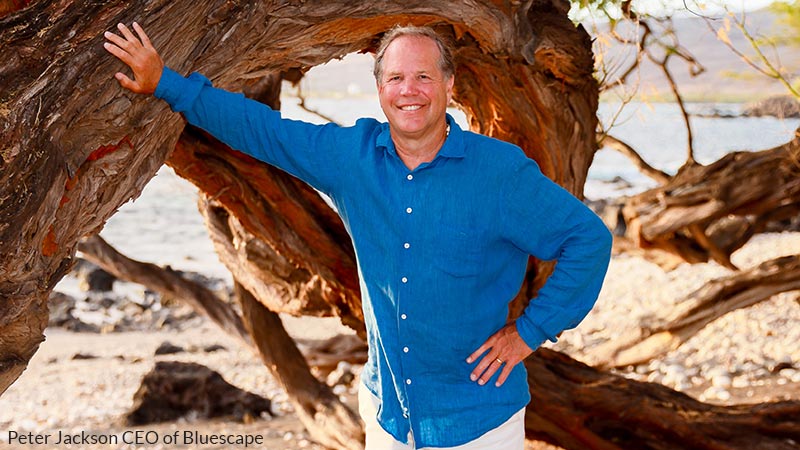Peter Jackson's Bluescape Provides the Big Picture for Global Collaborators
Peter Jackson is the CEO of Bluescape in Redwood City, California, which has a visual collaboration platform that makes it the most important privately-held tech company you've likely never heard of.

Although it only launched its ready-for-prime time product in December 2020, it has a gigantic backlog of orders from the likes of the Pentagon, Detroit automakers, and most of Hollywood's movie and TV studios. The number of users grew 300% this year to one million, many of them at startups, and the projected growth chart looks like a climb straight up Mt. Everest.
Bluescape sounds like a techie's impossible dream. It makes it easy for an unlimited number of participants worldwide to enter into a very secure creative conversation, whether on mobile, PC, Mac, multi-touch display, or an app. It is integrated with WebEx, Microsoft Teams, Dropbox, Zoom, Amazon Chime, and many other conferencing programs. Bluescape’s infinite storage enables constant communication for teams to collaborate on strategy, ideas, deliverables, and more, saving teams time and energy.
After troubles with other Internet platforms that could not handle the high-definition bandwidth required for films in remote post-production, Bluescape enables studios to have everyone involved be able to stop the video to synchronize real-time edits to the reel. It was also central to inventing the much-heralded all-electric Ford F-150 in 40% less time than it would have taken using traditional tools. The US Department of Defense allows real-time sharing of imagery that is critical to making life-and-death decisions.
It's no wonder that Fast Company named Bluescape to its March 2021 list of Most Innovative Companies (No. 9 in the Workplaces category).
"This is essentially an infinite, interactive whiteboard that is revolutionizing product collaboration for a wide range of industries, from life sciences to financial services," Jackson told Startup Savant. "It's been in development for many years, including rolling it out for 400,000 Amazon Web Services users for the past two years, and is available on its Marketplace. We now have $20 million in contracted annual revenue and expect growth to skyrocket in 2022."
The Bumpy Road of Lessons Learned
Jackson grew up in Berkeley, where his father was a corporate lawyer who, influenced by the 1960 social turmoil, eventually switched to represent unions and Native American tribes. His mother was a teacher at a school for the deaf and blind, and Peter learned how to communicate with her students. From fourth to ninth grade, he was among the first in the US to be bused out of a mostly white neighborhood to a school with mostly Black students, while his friends' families moved away to avoid this. At a time when soccer was not a popular sport, he managed to get an athletic scholarship and graduated from the University of California, Berkeley, with a degree in history in 1980.
One of his first jobs was selling technology, but at first, he wasn't very good at it, ending up at the bottom of a heap of 450 competing reps, he says. But by studying their habits and working around the clock, he was No. 1 within two years. However, his heart wasn't in it, and he wanted to spend more time at home, having recently married.
A friend offered to fund his first startup, Granite Systems, which developed ethernet switching technologies and launched in 1986. In 1989, his management skills were helped by a six-week summer boot camp for 30 budding entrepreneurs, including Michael Dell, with the professors drawn from Stanford University and Harvard. He took what he learned back to the company to reorganize its corporate structure, and it was acquired by Cisco in 1996 for $220 million.
"The journey was very turbulent, and there were times when I had to borrow money from in-laws and we nearly lost our home," said Jackson. "But I learned a lot about staying in compliance on bank debt and mostly avoided lawsuits! The team that got us to a successful exit likes to just recall the good times."
He was approached by a friend who needed help with his company. But before they worked out a deal, John Doerr, chair of the leading venture capital firm Kleiner Perkins, offered to fund a startup to improve the backend of a client, Netscape Navigator, the leading browser. Jackson founded Intraware and studied the competition from Microsoft's Internet Explorer, which was backed by Bill Gates' strategy of providing powerful incentives to clients to hit purchase targets for all its products. Jackson advised Netscape to go direct via an ecommerce platform, but building a better mousetrap was not a good enough solution up against Explorer 4 when it was bundled free for Windows users.
"Intraware had other clients, but we sold it for peanuts in 2009," said Jackson. As it was winding down, he spent time organizing regional events for the Young Presidents Organization networking and trying to decide what to do next.
"My family begged me not to do another startup, so I invested in my most successful startup: my four kids,” he said. "I began coaching them on their respective teams. Two were eventually recruited by Major League Baseball, one graduated from Stanford, and the other from Berkeley, so we're really proud of them."
He did help found the online ticket seller Eventbrite, which was funded by Sequoia Capital, and served on the board. It grew enormously before the pandemic and is now recovering. He also joined the board of Kanjoya, which enabled thousands of online communities to be created, and he helped it pivot to becoming a source of data for surveys and polls. It was sold to Ultimate Software in 2016. And he was on the board of DocuSign for a couple of years, advising them how to market to small companies.
He raised $4 million from family and friends to co-found Ziploop in 2013, which developed mobile software for a virtual wallet that managed shopping receipts, coupons, and rewards programs, but as it struggled, he was losing confidence in his ability to navigate the fiercely competitive startup ecosystem. Ziploop was acquired by Snipp Interactive in 2018, but well before that, Jackson came across Bluescape.
Escape to Bluescape
Bluescape was initially developed by the $3 billion furniture maker Haworth Inc. of Holland, Michigan, for its own internal use. It had become frustrated by having to physically design rooms for collaboration, so it created a set of interactive screens to do this from 2012 to 2017. It was cumbersome to use and expensive to install, so they had few other companies interested in adopting it. They decided they should try to spin it off to Silicon Valley and came knocking on Jackson's door.
"I was interested in finding a late-stage company to join, not another startup, but I didn't take it very seriously when Haworth reached out to me," recalled Jackson. "I wasn't enamored of their technology and told them that, in my view, they would need to invest another $200 million to be able to make a serious attempt to become successful, and they didn't blink at that. The Midwest has a lot of capital chasing too few exciting investment opportunities."
He agreed to become CEO in 2017, but the growth was sluggish as they were trying to build a new product while selling what they had ready. He recruited Rupen Chanda and his team of software developers in Waterloo, Canada, which had created Adobe's Flash and many of the apps for Blackberry, among other notable achievements over a 20-year period.
"But until they could build a new operating system, the equivalent of an electric vehicle, we could only offer a diesel, so we had a lot of customer complaints about crashes or the product not being accessible on mobile," he said. "Our Net Promoter Score [a measure of customer enthusiasm for a company] only went from negative to positive in 2021, when we launched the new platform and we've been adding features or announcing new developments every month."
For a long while, though, Bluescape also couldn't get serious interest from companies because it was treated as a "hobby," not a Top 10 budget item, the sort of new product that someone with a $100,000 budget might use for a project that might not continue in a year. Many new technologies avoid trying to scale the corporate walls to get official acceptance by offering a freemium to attract internal users, who then upgrade to premium and put it on an expense report that isn't scrutinized. Management might ban this, but that doesn't stop the new tools from being widely used, Jackson noted.
"We decided that because Bluescape had such enormous potential, our long-term growth was best served by taking our time to show each C-suite the potential for their transforming the capabilities of their enterprise," Jackson explained. "We were not trying to upgrade from a freemium because we had very serious security requirements that needed complete executive buy-in and the appropriate budget. We were building a battleship for sale, not a Trojan horse to try to sneak in."
But this wasn't just about developing software. They needed to build it to be able to scale it and train customers on how to add documents or post notes on video. They integrated it with Autodesk, which helped gain traction at movie studios, recently enabled Bluescape to connect to Slack, and announced a deal with Amazon to not charge for hosting conference calls on any system. Many universities are now using and teaching about it, and there is strong interest among European institutions of every kind.
"We are going to revolutionize the collaboration world," Jackson says.
About the Author

Scott S. Smith has had over 2,000 articles and interviews published in nearly 200 media, including Los Angeles Magazine, American Airlines’ American Way, and Investor’s Business Daily. His interview subjects have included Bill Gates, Richard Branson, Meg Whitman, Reed Hastings, Howard Schultz, Larry Ellison, Kathy Ireland, and Quincy Jones.
Startup Resources
- Learn more about Startups
- Visit the TRUiC Business Name Generator
- Check out the TRUiC Logo Maker
- Read our Business Formation Services Review
- Find Startup Ideas
- Explore Business Resources
Form Your Startup
Ready to formally establish your startup? Click below to read our review of the best business formation services!
Best Business Formation Services